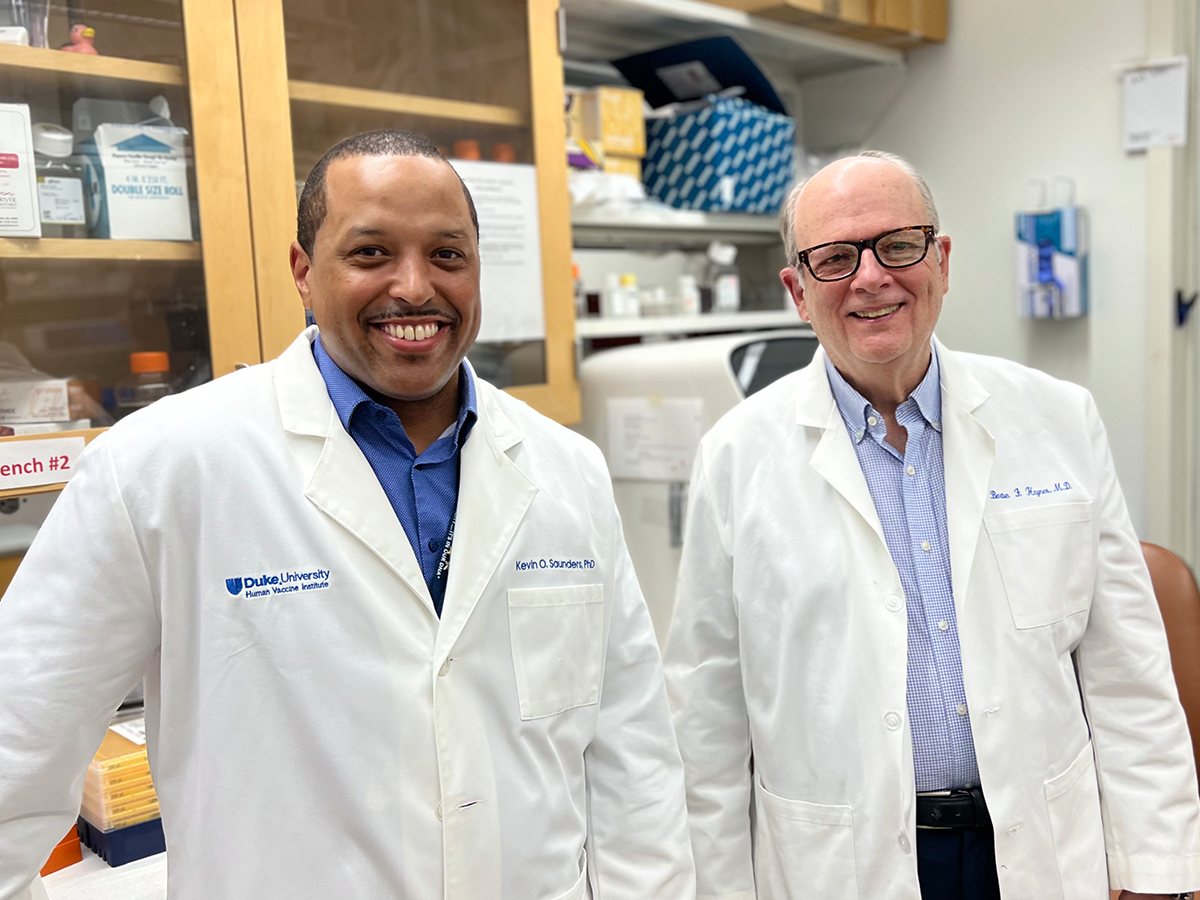Research
Research serves as the bedrock upon which we shape the future of our field. In the past year, we have achieved significant milestones, securing crucial funding that propels our ongoing quest for advancements benefiting our patients. Through collaborative efforts, we unite brilliant minds to cultivate innovative practices. Our endeavors have not gone unnoticed; we are garnering recognition on local, national, and global stages as we collectively strive toward our shared objective.
–Shelley Hwang, MD, MPH
Vice Chair of Research


Duke Surgery Remains #1 in NIH Funding
For the second year in a row, Duke Surgery ranked #1 among U.S. medical school surgery departments in funding from the National Institutes of Health (NIH), according to the Blue Ridge Institute for Medical Research.
Duke Surgery received nearly $45 million in NIH funding in 2022.
Four department members also ranked in the top ten highest-funded principal investigators among surgery departments.
Faculty of the Department of Surgery received a cumulative $96.3 million in research funding across FY ’23.
While most of the department’s research portfolio continues to be federally-funded, support from the private sector is substantially consequential.
In FY ’23, non-profit foundations, industry and other private sponsors contributed over $19 million to the research mission.
Of the total prorated dollar amount for FY ’23, more than $88 million were managed within the department to support 542 active research projects, clinical trials, fellowships, and institutional training projects.
8 Researchers Added to Grant Wall Installation
In 2023, eight new surgeon–scientists were added to the Grant Wall, signifying an individual achievement of receiving federal research funding.
Developed by Lauren Halligan, CMI, Medical Artwork Coordinator, the Grant Wall is a “living” art installation housed in the Duke Surgery central administrative office, which showcases a timeline of historical data honoring recipients of federal grants, contracts, and sub-awards.
Photo by HuthPhoto
Support for the Emerging Surgeon–Scientist
Residents, fellows, and post-doctoral researchers contribute substantially to the Duke Surgery research mission, and junior faculty are supported in developing their respective independent research programs.
Funding Trainee Curiosity
Through awards from federal, private, and philanthropic grants, 16 trainees in FY ’23 were granted funding to conduct meaningful research across various areas of interest, paving pathways for important improvements in clinical practice, surgical education, health equity, and patient care.
Launching Faculty Research Careers
Three Duke Surgery faculty were selected to receive K awards in FY ’23. Granted by the NIH, K awards provide support for researchers early in their careers, as senior postdoctoral fellows or early-career faculty (below).
Additionally, Daniel Nussbaum, MD, Assistant Professor of Surgery, was one of four School of Medicine faculty selected to receive a 2023 Physician-Scientist Strong Start Award by the Duke Office of Physician-Scientist Development.
AHA: American Heart Association; ASTS: American Society of Transplant Surgeons; TSF: Thoracic Surgery Foundation; VA: Veterans Affairs Scholar; IDEA: Inclusion, Diversity, Equity, and Access Scholar; OPSD: Office of Physician-Scientist Development Basic Science Research Track Scholarship; Sim: Simulation Fellowship
New K Awardees
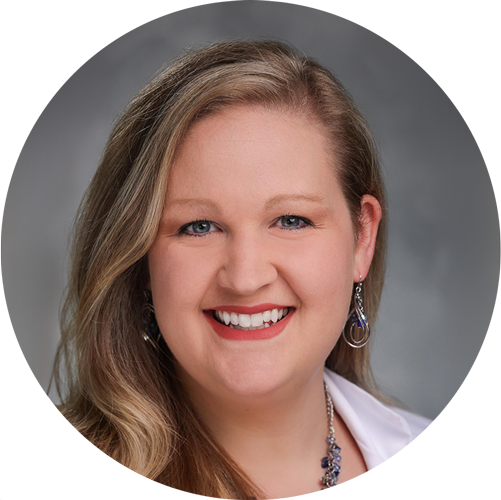
Erika Crosby, PhD
Intratumoral immunotherapy to enhance T cell infiltration and augment immune checkpoint blockade responses across molecular subtypes of breast cancer
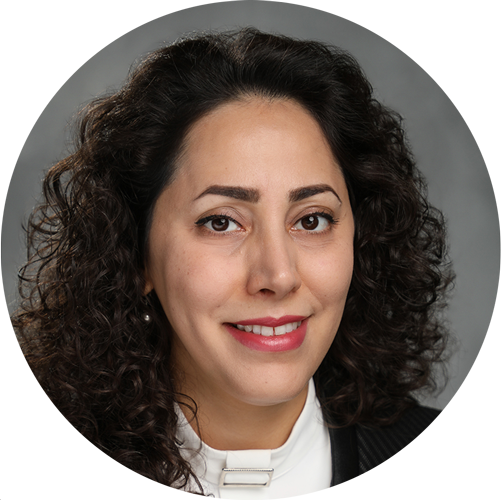
Zahra Kabiri, MD, PhD
Identifying Novel Intensity-Specific Regulators of RAS Signaling
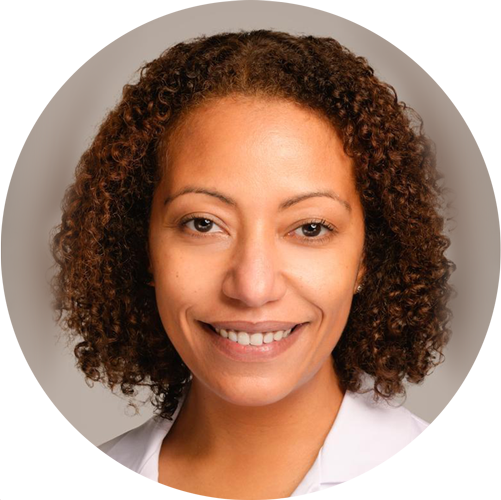
Lisa McElroy, MD, PhD
Improving Racial Equity in Clinical Decision Making about Access to Organ Transplant
High-impact Contributions to Scientific Understanding
in FY '23
Trainee Authors
In FY ’23, Duke Surgery investigators produced more than 700 publications. More than half of these articles were published in journals ranking in the top 25% of journals in that respective discipline.
Trainees were contributing authors on 18.1% of the total publication output, and more than half their articles were also published in top-quartile journals.
Note: Data does not include publications produced by Urology faculty.
in FY '23
Trainee Authors
In FY ’23, Duke Surgery investigators produced more than 700 publications. More than half of these articles were published in journals ranking in the top 25% of journals in that respective discipline.
Trainees were contributing authors on 18.1% of the total publication output, and more than half their articles were also published in top-quartile journals.
Note: Data does not include publications produced by Urology faculty.
Publication Volume by Division
The Divisions of Surgical Sciences, Cardiovascular and Thoracic Surgery, and Surgical Oncology led the way in both authorship volume and top-quartile publication, and investigators across every division contributed meaningfully to the literature in FY ’23, providing insights on a broad range of scientific topics and clinical care advancements.
Cross-Divisional Collaboration Fuels Research Success
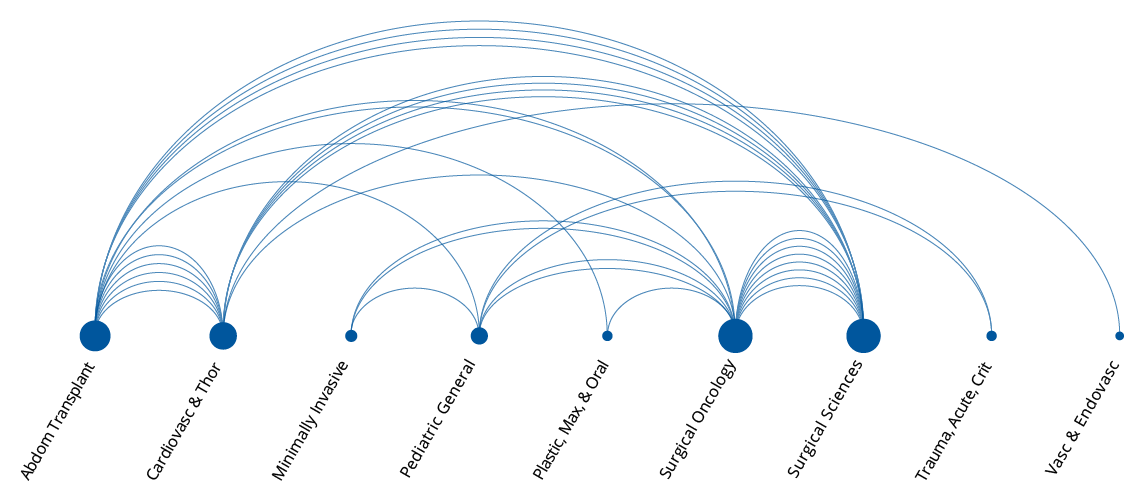
Interdisciplinary collaboration is key to making meaningful discovery across surgical specialties.
In FY ’23, more than 35 publications included authors from multiple divisions, reflecting the many interdisciplinary projects in progress across the department.
Numerous partnerships between faculty within the Division of Surgical Sciences and several of the clinical divisions—such as Surgical Oncology, Cardiovascular and Thoracic Surgery, and Abdominal Transplant Surgery—highlight the invaluable link between basic and translational science on the path to medical advancement.
High-impact Contributions to Scientific Understanding
in FY '23
In FY ’23, Duke Surgery investigators produced more than 700 publications. More than half of these articles were published in journals ranking in the top 25% of journals in that respective discipline.
Trainee Authors
Trainees were contributing authors on 18.1% of the total publication output, and more than half their articles were also published in top-quartile journals.
Note: Data does not include publications produced by Urology faculty.
Publication Volume by Division
The Divisions of Surgical Sciences, Cardiovascular and Thoracic Surgery, and Surgical Oncology led the way in both authorship volume and top-quartile publication, and investigators across every division contributed meaningfully to the literature in FY ’23, providing insights on a broad range of scientific topics and clinical care advancements.
Cross-Divisional Collaboration Fuels Research Success

Interdisciplinary collaboration is key to making meaningful discovery across surgical specialties.
In FY ’23, more than 35 publications included authors from multiple divisions, reflecting the many interdisciplinary projects in progress across the department.
Numerous partnerships between faculty within the Division of Surgical Sciences and several of the clinical divisions—such as Surgical Oncology, Cardiovascular and Thoracic Surgery, and Abdominal Transplant Surgery—highlight the invaluable link between basic and translational science on the path to medical advancement.
Coronavirus Research Powers On
Three years since the start of the COVID-19 pandemic, a sense of normalcy has returned to everyday life, but Duke Surgery researchers remain vigilant in their studies to ensure that the public continues to be protected against new and existing coronaviruses.
In 2023, faculty—such as David Montefiori, PhD, and Kevin Saunders, PhD—have continued their advocacy and research in developing better vaccines against variant strains of SARS-CoV-2.
Partnering with the Duke Human Vaccine Institute (DHVI), Dr. Saunders utilized his past HIV research to inform the development of the pan-coronavirus vaccine through a $21.5 million grant from the NIH. Now undergoing clinical trials, Dr. Saunders is hopeful that the pan-coronavirus vaccine can protect people against future coronavirus variants.
Read the full feature story on the Surgery website.
Leaders in Transplantation Research
New and established investigators drive research yielding influential discoveries that shape transplant patient outcomes, spanning topics such as equitable transplant candidacy, donation after circulatory death (DCD) heart transplant, xenotransplantation, and organ rejection prevention.
A study co-authored by General Surgery resident Imran J. Anwar, MD, found that an engineered antibody successfully prevented organ rejection when tested in primates that had undergone a kidney transplant, clearing the way for the monoclonal antibody to move forward in human clinical trials.
Prominent xenotransplantation researcher Stuart Knechtle, MD, Professor of Surgery; Jean Kwun, PhD, Associate Professor in Surgery; and Dr. Anwar co-authored a study published in Nature which demonstrated the successful design and testing of humanized porcine kidneys in non-human primates in the pre-clinical setting.
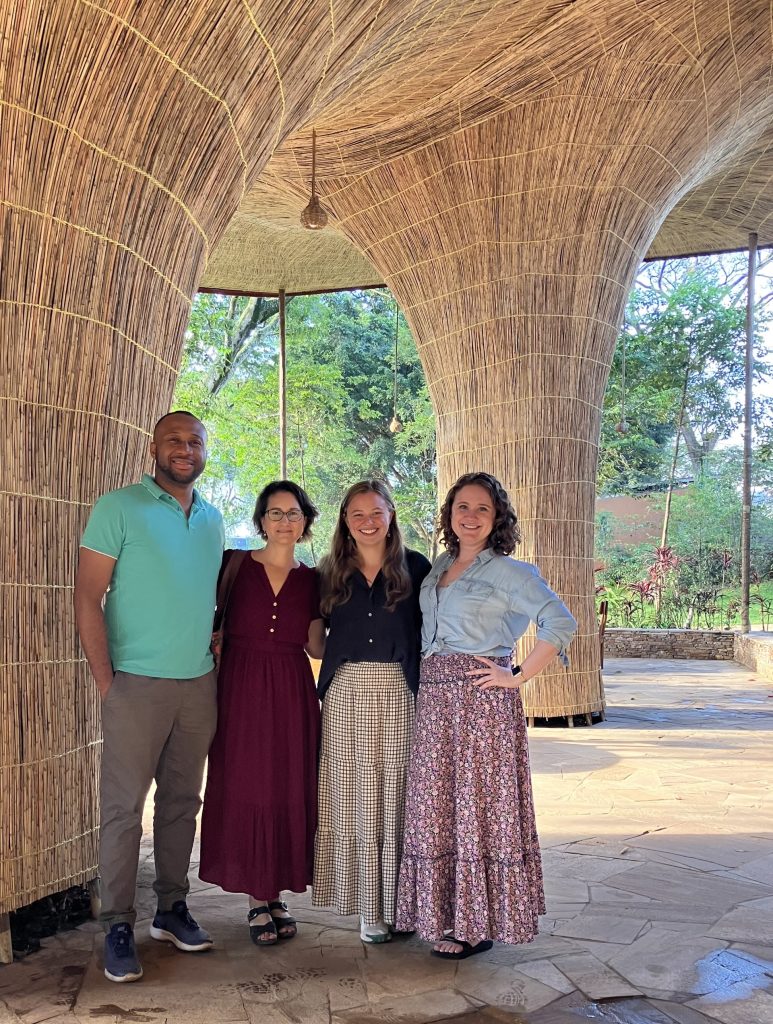
Reach of Global Health Research
Improving surgical outcomes and access to care in low- and middle-income countries abroad is a priority of many Duke Surgery researchers.
Uganda
For more than a decade, Tamara Fitzgerald, MD, PhD, Assosciate Professor of Surgery, has been working in Uganda to improve the pediatric surgery service and design medical devices to meet critical needs in sub-Saharan Africa.
In 2023, General Surgery residents Anthony Eze, MD, and Shannon Barter, MD, joined Dr. Fitzgerald in Uganda to begin addressing their individual research interests, focusing on education of midwives on the cause and treatment of gastroschisis, and using local resources to make laparoscopic surgery more accessible, respectively.
Tanzania
In a new global health research initiative to be piloted in Tanzania, Shelley Hwang, MD, MPH, Professor of Surgery and Vice Chair of Research, was awarded a biomedical engineering grant to test a new device that aims to diagnose breast cancer in patients in low- and middle-income countries.
Achieving CAP Accreditation
As the laboratory logistics and operations lead for Substrate Services Core Research Support (SSCRS), Chandler Sloan manages the day-to-day operations of SSCRS, supply chain, scheduling, preventive maintenance, and construction projects. She was critical this year in maintaining the quality metrics necessary for College of American Pathologists (CAP) accreditation. Chandler has also maintained a stellar 0% processing major error rate every month in 2023.

Chandler Sloan
Research Technician III
Growing Programs and Initiatives

Artificial Intelligence (AI) and Machine Learning (ML) Take Center Stage
It is vital for Duke Surgery to be at the forefront of AI and ML integration into healthcare in order to positively impact this still largely unfamiliar arena. Allan D. Kirk, MD, PhD, and Shelley Hwang, MD, MPH, contributed to a new American College of Surgeons (ACS) course on how AI and ML can be used in clinical decision-making. Duke Surgery faculty also advise and partner closely with Duke AI Health, and are collaborating with the Duke SPARK initiative for AI in medical imaging.
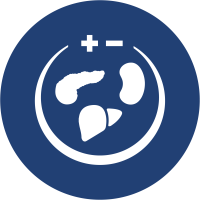
Consortium for the Holistic Assessment of Risk in Transplant (CHART) Established
Lisa McElroy, MD, Assistant Professor of Surgery, leads CHART, in collaboration with transplant and data science experts from Duke and seven additional academic medical institutions. CHART seeks to impart foundational change to the process of collecting, organizing, and employing data to determine patient transplant eligibility.

Clinical Research Unit (CRU) Enhances Recruitment Equity
Led by Clancy Leahy, PhD, RN, Research Practice Manager, and Matthew Hartwig, MD, Professor of Surgery, the CRU has made impactful efforts to more equitably recruit diverse patient populations for clinical trials, which has involved developing best practices for recruitment and training clinical research coordinators on these standards.

Center For AIDS Research (CFAR) Funds Exploration
Under the leadership of Georgia Tomaras, PhD, Chief of the Division of Surgical Sciences, Duke CFAR has expanded its reach and influence in HIV/AIDS research and discovery. Daniel Schuster, MD, MS, Surgery Research Fellow and member of the Tomaras Lab, was awarded a CFAR Pilot Award to fund a study on vaccine-elicited human B cells, as part of his PhD in Immunology thesis work exploring the impact of vaccine adjuvants on antibody effector functions.
Give to Duke Surgery Research
The Duke Department of Surgery is at the forefront of cutting-edge research. Gifts of all sizes to our research mission and the Division of Surgical Sciences support these novel advancements.
Be a part of achieving the Duke Surgery mission.

